Dental Implants — Greensboro, NC
The Foundation of a Better Smile
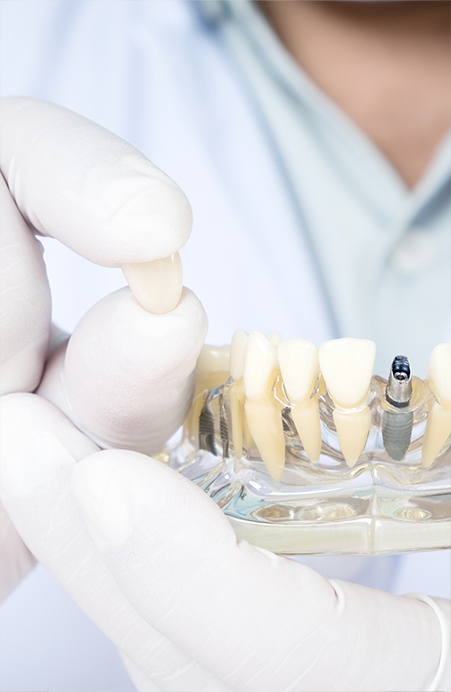
When you’re forced to live without your teeth, the harsh realities of the situation are quickly realized. Where you once ate freely without any reservations, you now have to be methodical and calculated with every morsel of food you bite into. In addition, not having a full set of teeth doesn’t bode well for your self-esteem. As a solution-oriented dentist, Dr. Fisher provides patients with dental implants in Greensboro to fully restore their lives to normal, allowing them to once again flourish. To take control of your destiny, contact our Greensboro office today to schedule an initial examination and consultation!
Why Choose Dr. David M. Fisher, Jr. For Dental Implants?
- Beautiful Restorations to Replace One or Many Teeth
- Partners with Local Specialists for Implant Placement
- Knowledgeable Dentist Treats Patients Like Family
What Are Dental Implants?
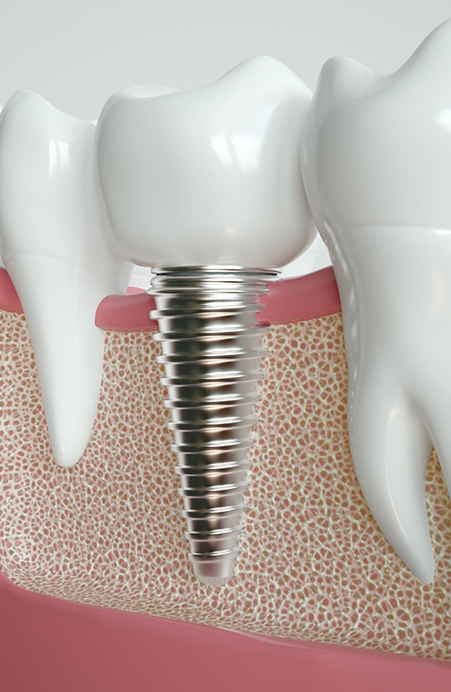
Dental implants are clearly the best solution for tooth loss because they replace not only the visible crown but the underlying root as well. The implant itself is inserted directly into the jawbone and later topped with a crown to make it look and function just like a natural tooth. Your implant will stimulate your jawbone in a way that crowns, bridges, or dentures alone simply cannot. This prevents the bone from deteriorating and making your facial appearance become hunched over time. Fortunately, dental implants can easily solve this problem.
4-Step Dental Implant Process
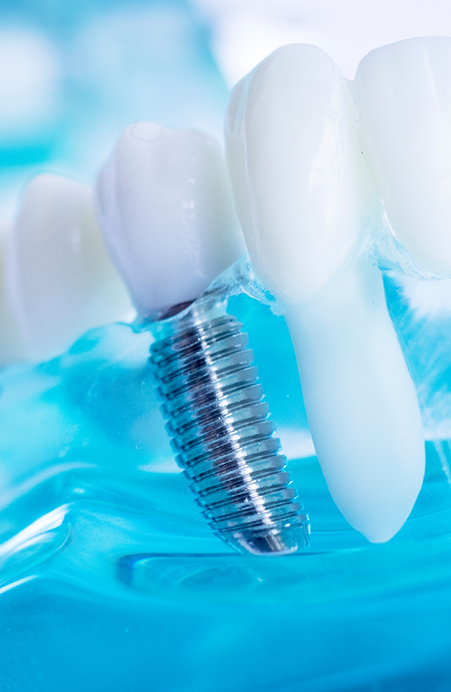
Unlike dentures or a dental bridge, restoring your smile with dental implants is a multistep process that spans several months. However, both patients and dentists agree that the long-term benefits are well worth the time and effort! When you come to see us, we’ll walk you through your entire treatment plan step by step. Essentially, there are four main stages of getting dental implants.
Initial Dental Implant Consultation
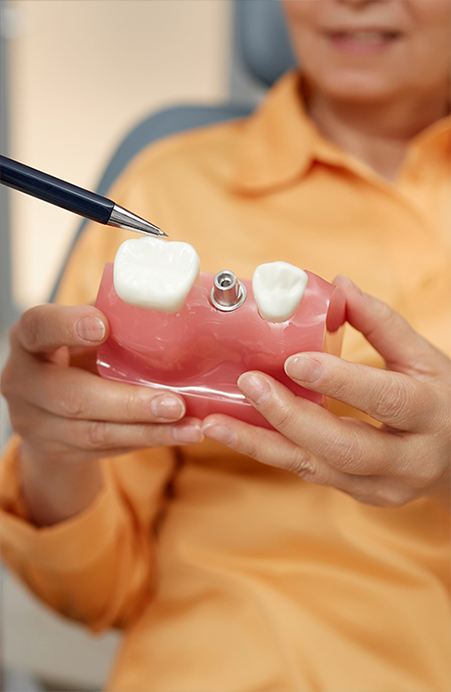
After you’ve booked a consultation, Dr. Fisher will sit down with you to discuss your smile goals. He will evaluate your teeth, gums, and jawbone health to figure out if you’re a good candidate for this procedure. Your oral health must be in good condition before receiving dental implants. If we determine that you don’t have enough healthy jawbone to support a dental implant right now, Dr. Fisher may recommend a bone graft first to strengthen your jawbone. After this or any other needed treatments have been conducted, your dental implant surgery can begin.
Dental Implant Surgery
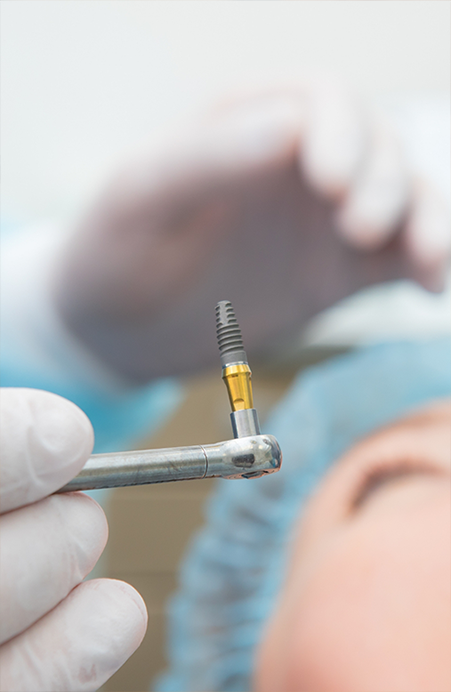
Dr. Fisher partners with local specialists in Greensboro who are equipped to place dental implants safely and correctly. Before the surgery begins, you will receive local anesthesia. Then, the implant dentist will make small incisions in your gums to access your jawbone. They will then create holes where the implants will be placed. Although this process sounds painful, the implant dentist will make sure you are nice and numb with local anesthetic, so you don’t feel a thing. We might even recommend sedation dentistry for our more anxious patients so you can receive the treatment you need without any worries. You may be sore for a few days after the surgery, but that is to be expected and can be managed with over-the-counter pain relievers like ibuprofen.
Dental Implant Osseointegration/ Abutment
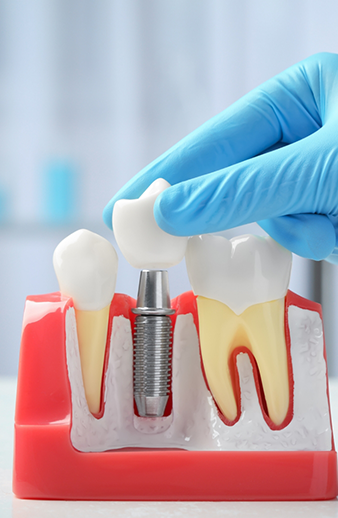
Dental implants are typically made of titanium, a biocompatible material that blends well with the human jawbone. For three to six months, your jawbone will grow around the implant post until it essentially becomes a part of your own anatomy. During this time, Dr. Fisher can place a temporary crown over your implant to restore the appearance of your smile. Once your implants are fully healed and integrated with your jawbone, we will attach abutments, or metal connectors onto which we can place permanent restorations, like crowns, bridges, or dentures.
Delivery of Dental Implant Restorations
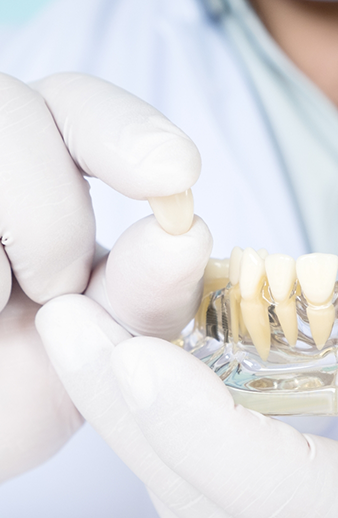
After your implants have healed and your abutments are placed, you’re ready to receive your custom-made implant restoration. Depending on the number of teeth you’re missing, we will suggest either a crown, a bridge, or dentures. Your restoration will be crafted by a team of experts who will make sure it seamlessly blends in with the rest of your smile. While the dental implant process in Greensboro seems long, it’s well worth it for a completely beautiful and functional smile that can last a lifetime.
Benefits of Dental Implants

Because dental implants in Greensboro mimic original teeth in strength and function, they can deliver multiple advantages over more traditional tooth replacement options. Not only do they solve the obvious problem of having noticeable gaps in your grin, but they come with several benefits for your health and overall quality of life. Read on to learn some of the reasons why dental implants are often considered the best way to replace missing teeth!
Day-to-Day Benefits

- Eat without worry – People with dental bridges or dentures tend to avoid foods like steak, apples, and corn on the cob because this solution only renews about 20-30% of your original biting power. In contrast, dental implants restore 70% or more, allowing you to eat anything on your plate with ease.
- Drink all of your favorite beverages – Due to the materials they’re made from, traditional dentures usually warp when exposed to hot drinks like coffee, tea, and hot chocolate. Dental implants, on the other hand, maintain their shape at every temperature, so you can enjoy all of your favorite drinks.
- Smile confidently – Your implant dentist in Greensboro will design your restoration to look exactly like your natural pearly whites. Additionally, you won’t have to worry about them loosening, slipping, or falling out. You’ll be able to smile confidently knowing that it looks and feels perfectly natural!
Health Benefits

- No sensitive teeth or irritated gums – Dental bridges rely on the surrounding teeth for support, weakening them and leading to sensitivity. As dentures lose their fit over time, they move around and cause sores and irritation on the gums. Dental implants are self-supporting and secure in the jaw, preventing both of these problems.
- Preserve your jawbone and stay looking young – After teeth are lost, the jawbone begins to deteriorate. Eventually, it can no longer adequately support the facial structures, leading to a sunken and wrinkled appearance that ages you. Since dental implants stimulate the jawbone like real tooth roots, they keep it strong enough to help you stay looking youthful and vibrant for years to come!
- Keep your mouth and body healthy – Dental implants are easy to care for, so they reduce your risk of gum disease and other oral health problems. Because gum disease has been linked to diabetes, arthritis, osteoporosis, heart disease, and more, dental implants can help you maintain a healthy body as well as a healthy smile.
Long-Term Benefits

- Reliable, lasting results – Even after more than 10 years, the risk of dental implant failure is less than 5%. With the right maintenance, they could even last the rest of your life. Fortunately, caring for dental implants is often as simple as brushing, flossing, and attending dental checkups regularly.
- A cost-effective solution – One of the most important benefits of dental implants in Greensboro is their ability to save you money over the years. While they cost more upfront than dentures and bridges, they won’t break down and have to be replaced every few years. They’ll save you valuable money (and time) that you might otherwise spend on dental appointments due to their impressive long-term success rate.
Who Dental Implants Can Help

No matter how many teeth you’re missing, we can help you complete your smile with dental implants. During your consultation at our Greensboro office, Dr. Fisher will carefully examine your mouth, gums, and any remaining teeth to evaluate your oral health. From there, he will fully explain all of your options as well as his recommendations.
Who Is a Good Candidate for Dental Implants?

Not every patient who visits our office for dental implants is an ideal candidate for the procedure right from the get-go. In fact, many of our patients need preparatory procedures to help restore the structure and health of their mouths to ensure that their implants last as long as possible. With that in mind, here are some qualities that an ideal candidate would have:
- Sufficient jawbone density.
- Good oral health.
- Are free from autoimmune disease.
- Don’t excessively drink alcohol or use tobacco.
If you don’t quite possess these qualities yet, Dr. Fisher will work with you to develop a plan so you can. All you need to do is schedule an initial consultation with him.
Dental implants can solve any type of tooth loss, including:
Missing 1 Tooth

For one missing tooth, we’ll likely suggest getting a single dental implant to replace it. The titanium post will act to replace the root of your missing tooth, and a customized dental crown will be placed on top.
Missing Multiple Teeth
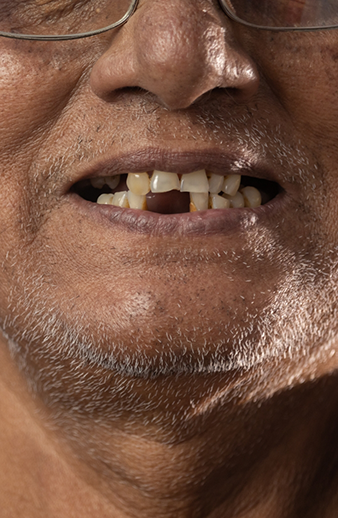
For consecutive missing teeth in a row, a bridge can be attached to two or more implants to replace them. Unlike a traditional dental bridge, your existing teeth won’t need to be altered to secure it, keeping your healthy pearly whites untouched.
Missing All Teeth

When you’re missing all of your teeth along an arch of your mouth, it may require the placement of four to eight dental implants to hold a complete denture. They will provide you with additional support, making it easier to chew and speak again.
Understanding the Cost of Dental Implants
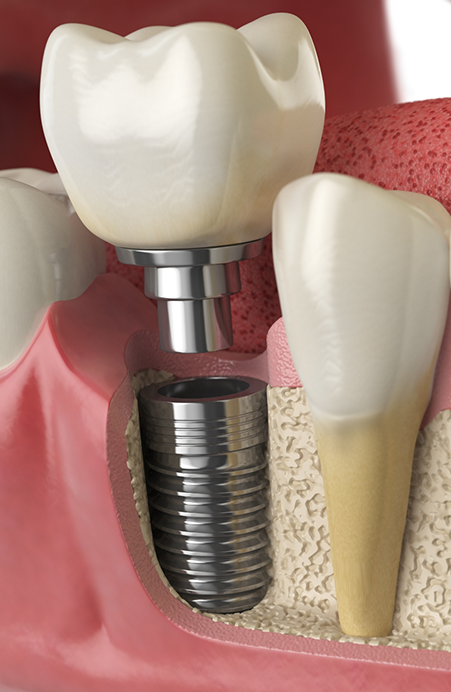
Dental implants may have a higher upfront cost than traditional restorations, but countless patients and professionals will agree that they’re well worth the investment. When taken care of properly, you’ll be able to enjoy a smile that can last a lifetime, which is priceless. There’s no set price tag attached to the procedure, so the cost is determined based on a variety of factors that Dr. Fisher will break down for you during your initial consultation.
Preliminary Treatments & Dental Implant Surgery
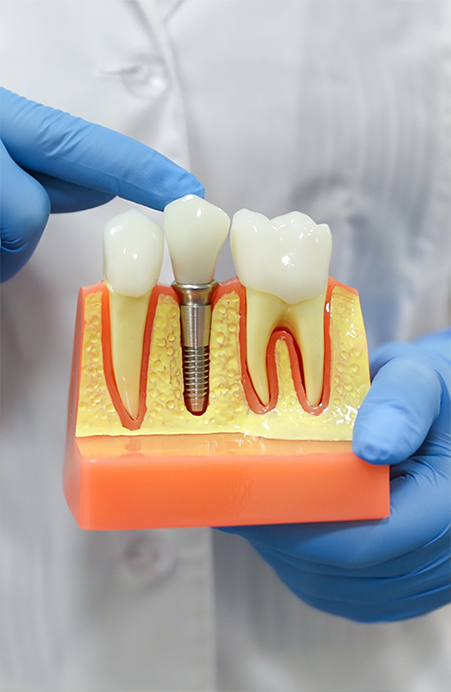
If you require any preparatory procedures, like a bone graft, sinus lift, or gum disease therapy, these will be added costs to your treatment. They’re necessary because, without a healthy foundation for your smile, you may be at a higher risk of implant failure.
Once your oral health is up to par for implant surgery, you can start your journey to a complete and fully functional grin. Dr. Fisher partners with local specialists to perform the surgical component of your treatment, so you should expect a separate fee to come from their office. The price of your surgery can go up if you require sedation or anesthesia, or your implants need to be placed in a difficult position in the mouth, like the front, visible area.
The Parts of Your Dental Implant
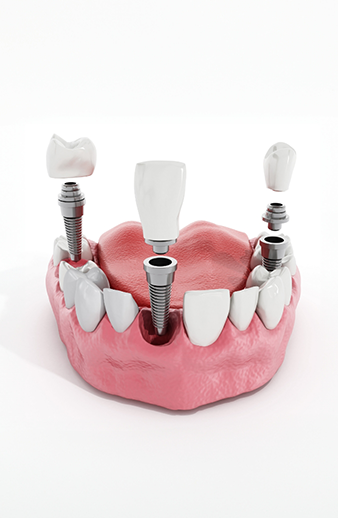
There are a few additional factors that can impact the cost of your procedure, including:
- The number of implants that you need to have placed. Typically, crowns are placed with one implant, bridges are secured with two, and dentures can be secured with anywhere from four to eight.
- The type of restoration you need and the materials that you’d like to have them crafted from.
- The materials that your dental implants are made from.
If you have any questions, please don’t hesitate to ask our team during your consultation. We’ll be happy to break down costs and try our best to keep your treatment within your budget.
How Dental Implants Can Save You Money

Dental implants are well worth the investment. They offer countless unique benefits to your everyday life that make them priceless. While there are additional tooth-replacement options available, none of them offer the stability, strength, and longevity of dental implants. Plus, because they’re easy to maintain, you won’t have to worry about discomfort, oral sores, or developing oral health problems. Since they replace the entire structures of your missing teeth, they’ll feel and look completely natural, boosting your confidence when you talk or eat. Not to mention, since dental implants can last up to four times longer than traditional restorations, you won’t have to spend as much money or time at the dentist’s office replacing and repairing your restorations.
Does My Dental Insurance Cover Dental Implants?

Even though most dental insurance plans don’t cover the cost of dental implants, they may cover other portions of the treatment, which is why it’s always worthwhile to check. Depending on your individual benefits, they may cover a portion or all of the cost of anesthesia, your custom restoration, or the initial consultation. If you need help getting in touch with your insurance, our team would be more than happy to help.
Advanced Dental Implant Procedures
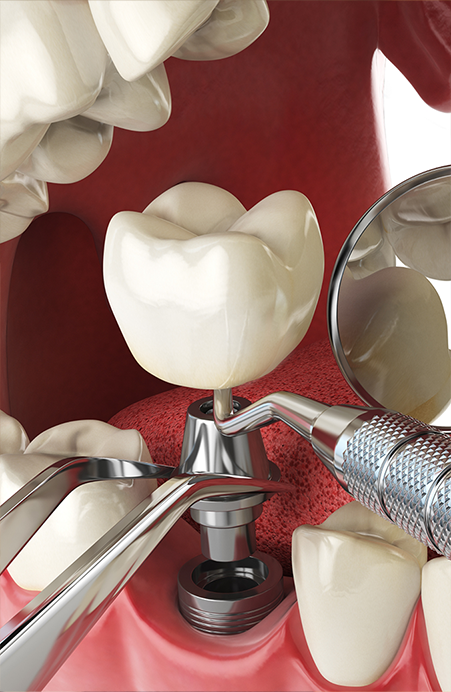
Since the jawbone will usually start to lose its density once your teeth are gone, there’s a good chance that you’ll lack the bone height necessary to receive dental implants at first. However, you might still be a candidate for the procedure after receiving a bone graft or a sinus lift. Both surgeries involve transplanting new bone tissue to your jaw and encouraging it to heal and rebuild itself. A sinus lift is specifically performed on the upper jaw and can also move the sinuses so that they don’t get in the way during implant post-placement.
Bone Grafting
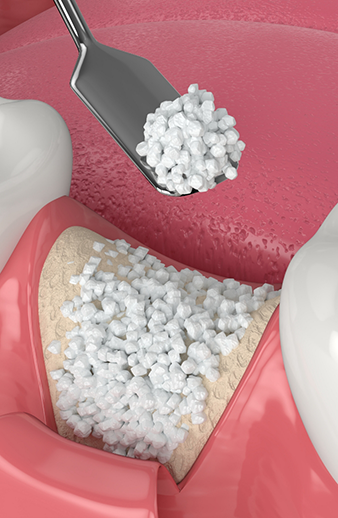
The jawbone relies on the pressure and chewing stimulation provided by your teeth to remain strong. Once you’ve suffered tooth loss, the unused portion of the bone will start to break down, much like how an unused muscle will atrophy. This is a problem when getting dental implants because there needs to be enough bone to support the posts.
That is where bone grafting comes in. During the procedure, replacement bone tissue is transplanted into your jaw, which in turn encourages your body to start creating new bone tissue. This effectively reverses the damage caused by bone loss. The replacement tissue often comes from elsewhere in your body (likely the hip or the back of the jaw), though it may also be provided by a human or animal donor.
The bone grafting surgery can take about 45 to 90 minutes. Your mouth will need time to heal after bone grafting before the dental implant surgery can be performed. This process can take anywhere from 3 months to a year, depending on the patient and the extent of the damage. There are situations where only a small amount of grafting is required, and you might be able to receive dental implants on the same day in those cases.
Sinus Lifts
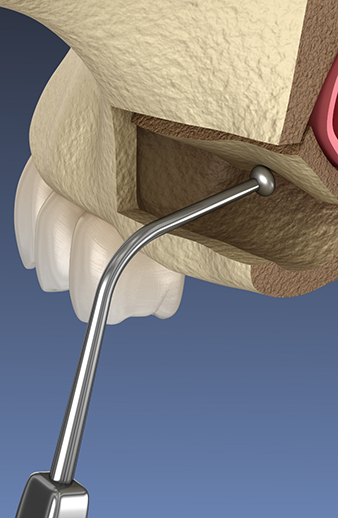
Sinus lifts are only used for the upper jaw. Like bone grafting, it can be used to replace bone height that was lost due to missing teeth. It may also be necessary to move your sinuses if they’re too close to the jaw for dental implants to be placed. (The shape and size of the sinus are different for everybody, and it tends to get larger as you age; that is why it may or may not be an issue for certain patients.) This procedure has become more common in recent years, in part thanks to the growing popularity of dental implants.
During the procedure, a small incision is made where the teeth used to be. A window is then made in the bone, exposing the membrane between the sinus and the jaw. The membrane is pushed up and away, and grafting material is placed in the space. It normally takes about 4 to 9 months for the grafted material to fully mesh with the bone. Dental implant surgery can proceed after recovery is complete and the proper level of bone density has been restored.
Maintaining & Caring for Your Dental Implants

With a success rate as high as 95% and the potential to last a lifetime, it’s not hard at all to see why dental implants have become the gold standard of tooth replacement. Of the around 5% of dental implant cases that fail, most of them are caused by failing to properly maintain and care for them. The good news is that this is easy to prevent – dental implant care in Greensboro is about as straightforward as caring for real teeth. Below, you’ll find the five steps you need to take to ensure your dental implants last.
Make Oral Hygiene a Priority

Yes, it’s true that dental implants can’t get cavities. However, you’ll still need to brush them, along with any remaining teeth, twice a day. Otherwise, particles of food could linger on them and attract bacteria that infect your gums. Gum infections are the leading cause of dental implant failure, so you’ll want to avoid it at all costs. In addition to brushing, you should also floss and rinse with an antibacterial mouthwash at least once daily.
Eat a Healthy Diet

Another way to minimize bad bacteria in your mouth is to stick to a nutritious diet. Overindulging in sugary foods and beverages gives these bacteria ample fuel to inflame the gum tissue that supports your dental implants in Greensboro. Swap out these items for ones that will promote great jawbone and gum health, such as leafy greens, lean meats, and dairy products.
Break Harmful Habits

Most of us have bad habits, but some of them can damage your smile more than others. Chewing on pens or pencils, eating ice, smoking, and using your teeth to open containers or packaging can loosen, chip, or break your teeth (both real and artificial). Not only can this be stressful and painful, but you might end up having to get expensive treatments. You already made a huge investment by getting dental implants, so make sure to protect it by quitting bad habits that could harm your smile.
Protect Your Dental Implants
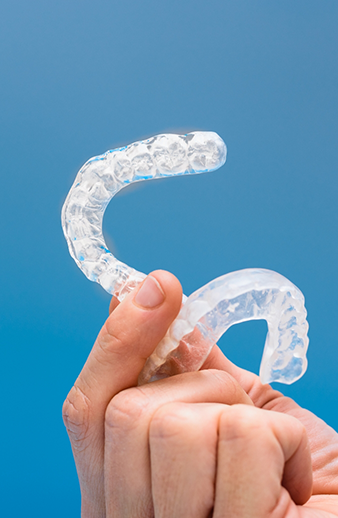
If you like to play sports or grind your teeth when you’re stressed or asleep, you’ll want to wear a protective mouthguard. Your implant dentist in Greensboro can custom-make one of these appliances, which are designed to comfortably fit over your teeth and shield them from sports-related injuries or wear and tear from teeth grinding.
Schedule Regular Dental Checkups

Even patients who have no natural teeth left should still attend routine dental checkups. After all, when it comes to your smile, it’s better to be safe than sorry! Dr. Fisher will check for any signs of problems with your implants, gums, and remaining teeth. The sooner our team catches these issues, the easier (and more cost-effective) it will be to treat them.
Dental Implant FAQs
Does It Hurt to Get Dental Implants?
Patients who want to replace their missing teeth in Greensboro but who are iffy about how painful the procedure will be won’t have to worry when they visit our office. Dr. Fisher works with Greensboro implant dentists who use every technique available to make sure that patients’ dental implant surgery is pain-free. The first thing they will do is numb the area with local anesthetic. If you’re still anxious about the thought of having your implants placed, you may be able to receive sedation dentistry to calm existing nerves.
What Is the Recovery Process Like After Dental Implant Surgery?
The recovery process of your dental implant surgery largely depends on a couple of factors, including how many dental implants you need to be placed and where they’re located in your mouth. If you only need one implant, the surgery will be less intensive and you should be able to make a quick recovery, getting back to your daily routine within a day. However, if you need multiple implants, you may require a couple of days of rest while your gums heal. You can speed this process up by following aftercare instructions, drinking plenty of fluids, and eating a soft diet.
How Long Will It Be Before My Permanent Replacement Teeth Are Placed?
Every patient’s dental implant procedure varies depending on several factors that can either shorten or lengthen the treatment process. However, most patients don’t have their permanent replacement teeth placed until several months after their implant surgery. This is because there is a long healing period required before you can have your abutments placed. During this time, your implants will naturally fuse with your jawbone through a process called osseointegration, which provides your restorations with strength, support, and stability. Although this procedure requires an investment in your time, patients and professionals agree that it’s well worth it.
Can Dental Implants Fail?
Dental implants boast an astonishing success rate of over 95% even 10 years after they’ve been placed! This is largely thanks to their secure position in your jawbone. However, there is still a remote chance of dental implant failure due to:
- Injury: If you play sports, make sure your dental implant is fully protected with the help of a custom-made sports mouthguard.
- Bad chewing habits: Chewing on hard objects like pen caps, ice, or your fingernails and using your teeth as tools to open packages or bottles can potentially damage your restoration and loosen your implant.
- Poor oral hygiene: Regular brushing and flossing are essential for keeping your gums and the connective tissues that help hold your dental implant in place healthy and strong.
- Smoking or chewing tobacco: Tobacco slows down your healing process, damages your oral soft tissues, and puts you at a much higher risk of gum disease, oral cancer, and other issues that could cause your implant to fail.

